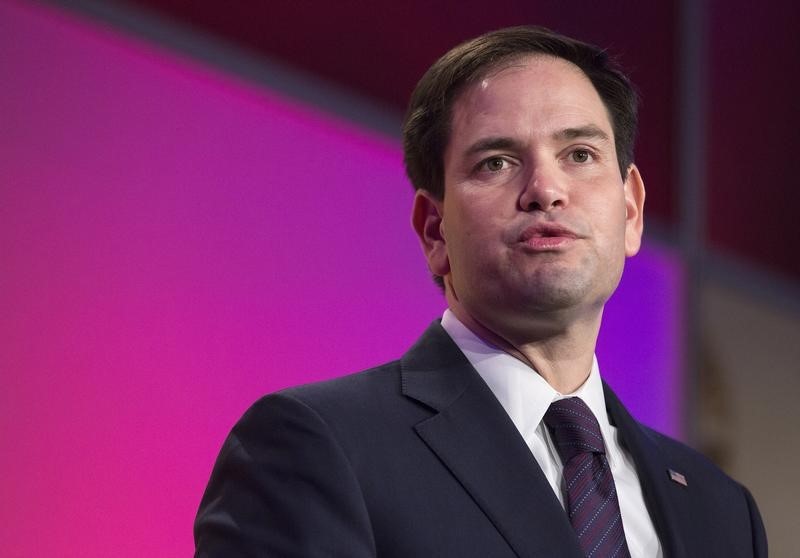By Steve Holland and Alistair Bell
MIAMI/WASHINGTON (Reuters) - U.S. Senator Marco Rubio will make a muscular foreign policy a focal point when he announces his presidential candidacy on Monday, portraying himself as the Republican most ready to handle threats to America in a chaotic world.
Advisers say a key part of the Cuban-American's election strategy for 2016 will be a "peace-through-strength" global view based on increased defense spending.
To highlight his foreign affairs credentials, Rubio, 43, a first-term senator from Florida, will announce his bid for the Republican nomination with a speech at Miami's Freedom Tower, where thousands of Cuban exiles fleeing the communist-run island in the 1960s were first registered by U.S. authorities.
His support registers in single digits in opinion polls on likely Republican contenders, but aides believe Rubio, who was on 2012 nominee Mitt Romney's short list for vice president, will rise when voters take a closer look at him.
Rubio's attempt to capture the campaign spotlight came as Hillary Clinton declared her candidacy on Sunday for the Democratic presidential nomination in a video announcement that grabbed worldwide media attention.
Clinton, a former secretary of state, will hit the campaign trail in Iowa on Tuesday and Wednesday. Iowa holds the kickoff contest in the parties' presidential nominating process early next year.
Rubio, a member of the Senate Foreign Affairs and Intelligence committees, is expected to lay out a vision of American leadership in a world menaced by Islamist extremism and authoritarian governments from Russia to China and Iran.
On domestic policy, he backs the classic Republican remedies of small government and low taxes, and an end to President Barack Obama's healthcare law.
Rubio takes some of his foreign policy advice from a group of neo-conservatives linked to the administration of former President George W. Bush. One senior aide, Jamie Fly, argued in a 2012 magazine article for "regime change" in Iran, bringing back memories of the U.S. invasion of Iraq in 2003.
GROWING REPUBLICAN FIELD
Rubio becomes the third major Republican figure to announce his candidacy, after Senator Ted Cruz of Texas, another Cuban-American, and Senator Rand Paul of Kentucky. The Republican field is expected to grow considerably, likely including former Florida Governor Jeb Bush, a one-time mentor to Rubio, who will rival him for votes and donor money in primary states.
Rubio's national security stance could attract primary voters in key conservative states such as South Carolina, one of the early voting states in the primary season. Conservatives are wary, however, of his prominent role in drafting a broad immigration bill in 2013, although he has since backed off a comprehensive reform effort.
With Clinton the early favorite to be the Democratic nominee, the eventual winner of the Republican race needs to be sharp on world affairs.
Reversing recent "sequestration" spending cuts on the U.S. military is a main component of Rubio's foreign policy. One of Rubio's top outside advisers on defense spending, Eric Edelman, was a senior Pentagon official and aide to Vice President Dick Cheney. He says he regularly briefs the senator.
"It's mostly about defense, but I've talked to him about the authorization of military force. I've talked to him about the campaign against ISIS, about Russia and Ukraine. There's not a shortage of issues right now," Edelman said.
Rubio is critical of Obama's diplomatic opening to Cuba and strongly opposes Venezuelan President Nicolas Maduro's government, which he has described as made up of "thugs."
Elliott Abrams, who also has advised Rubio, said the freshman senator's Cuban background - his parents came to the United States in the 1950s - made him more sensitive to issues of freedom abroad.

"The whole question of the expansion of freedom of democracy is of greater interest to him as a foreign policy theme than it is for many other people," said Abrams, a former senior diplomat who served the George W. Bush and Ronald Reagan presidencies.